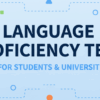
Language proficiency test results are often required by universities, their programs, and the embassies of the countries international students are targeting. For example, many universities and institutions in the US, UK, Australia, and Canada ask applicants to meet minimum scores in English proficiency tests such as IELTS for undergraduate, master’s, and doctoral programs. Similarly, if you are applying for Spanish-taught courses in Spain, universities and Spanish consulates typically require a Spanish proficiency test such as DELE. Keep in mind that (i) postdoc applicants are not subject to language proficiency tests, and (ii) English test results are usually enough for doctoral positions in many countries, except for the non-research and non-English-taught ones. Let’s explore more!
Arabic Proficiency Tests
International students applying to Arabic-taught programs in Saudi Arabia, Egypt, Jordan, or other Arabic-speaking nations must often complete an official Arabic Proficiency Test. Common options include the Arabic Language Proficiency Test (ALPT), Qiyas Test, or Hamza Exam, all designed for non-native speakers. These exams evaluate reading comprehension, listening, writing, and grammar accuracy within academic contexts. Universities such as King Saud University in Saudi Arabia, Cairo University in Egypt, and the University of Jordan in Amman typically require applicants to meet specific proficiency levels before admission. Achieving high scores in these recognized tests demonstrates readiness for coursework, research, and academic communication in Arabic across major Middle Eastern institutions.
Chinese Proficiency Tests
Non-native applicants pursuing Chinese-taught degrees in China, Taiwan, or Singapore typically must pass a Chinese language proficiency test, such as the HSK (Hànyǔ Shuǐpíng Kǎoshì) and its oral counterpart, HSKK. Administered by Hanban/CLEC, these exams assess vocabulary, grammar, listening, and speaking skills from HSK Level 1 to 6. Most Chinese universities require HSK Level 4 or higher for undergraduate admission and HSK 5–6 for postgraduate and research programs. Top institutions such as Tsinghua University, Peking University, and Fudan University often demand advanced HSK results to ensure academic readiness. High scores in these recognized language proficiency tests demonstrate sufficient Mandarin proficiency for lectures, exams, and participation in Chinese academic environments.
English Proficiency Tests
English language proficiency is essential for admission to universities in English-speaking countries, including Australia, Canada, the United Kingdom, the United States, and New Zealand. The most widely accepted English language proficiency tests include IELTS (Academic), TOEFL iBT, PTE Academic, and Cambridge English Qualifications (C1 Advanced and C2 Proficiency). Some institutions also accept the Duolingo English Test and the Occupational English Test (OET) for specific programs. These exams assess listening, reading, writing, and speaking skills, and universities often set minimum scores for each section. Students applying to these countries for a PhD (e.g., PhD in USA, PhD in UK, PhD in Australia, or PhD in Canada) are typically required to submit results from one of the recognized English proficiency assessments.
French Proficiency Tests
For international students applying to French-taught programs in France, Belgium, Switzerland, or French-speaking Canada (Québec), demonstrating proficiency in French through an approved language proficiency test is crucial. The most recognized options include DELF (Diplôme d’Études en Langue Française), DALF (Diplôme Approfondi de Langue Française), and TCF (Test de Connaissance du Français). These exams, certified by France’s Ministry of Education, measure listening, reading, writing, and speaking at CEFR levels A1–C2. Universities in France typically require B2 or C1 proficiency for admission to undergraduate, master’s, or PhD in France programs. Many institutions in Francophone Europe and Canada also accept these French language proficiency tests as proof of strong academic and communication ability.
German Proficiency Tests
Applicants seeking admission to universities in Germany, Austria, or Switzerland must demonstrate German language skills through an official German language proficiency test. The most recognised options include TestDaF (Test Deutsch als Fremdsprache), DSH (Deutsche Sprachprüfung für den Hochschulzugang), and ÖSD (Österreichisches Sprachdiplom Deutsch). Certificates from the Goethe-Institut (B1–C2) are also widely accepted. German universities typically require TestDaF Level 4 or DSH-2 for degree programs. Students pursuing a PhD in Germany must meet even higher standards, often at the C1 level, to ensure they can fully engage in research discussions and academic writing in the German language. These tests validate linguistic readiness for studying or conducting research in German.
Italian Proficiency Tests
To study in Italy or Italian-taught programs abroad, applicants must pass an accredited Italian language proficiency test such as CILS (Certificazione di Italiano come Lingua Straniera) or CELI (Certificato di Conoscenza della Lingua Italiana). Recognized by Italy’s Ministry of Education, these exams measure comprehension, grammar, writing, and oral communication skills at CEFR levels A1–C2. Universities such as Sapienza University of Rome, Politecnico di Milano, and the University of Bologna typically require B2 or C1 proficiency for admission to undergraduate, master’s, or doctoral programs. Achieving strong results in these language proficiency tests demonstrates readiness for academic coursework, research participation, and everyday communication within Italian university settings.
Japanese Proficiency Tests
International students planning to study in Japan or enroll in Japanese-taught programs must take an approved Japanese proficiency test. The most common options are the JLPT (Japanese Language Proficiency Test) and the EJU (Examination for Japanese University Admission for International Students). The JLPT has five levels (N5–N1), and most universities require N2 or N1 proficiency for admission to degree programs conducted in Japanese. The EJU also measures academic readiness and subject knowledge relevant to university study. High scores in these official exams are often mandatory for entry to prestigious institutions such as The University of Tokyo, Kyoto University, and Osaka University, ensuring applicants are linguistically prepared for academic success.
Korean Proficiency Tests
Students applying to universities in South Korea usually need to pass a recognized Korean language proficiency test, such as TOPIK (Test of Proficiency in Korean). This exam evaluates reading, listening, and writing skills across six levels, from Level 1 to Level 6. Most Korean universities require TOPIK Level 3–4 for undergraduate admission and Level 5–6 for graduate programs. Several Korean institutions also accept the KLAT (Korean Language Ability Test). High TOPIK scores are particularly important for admission to top universities such as Seoul National University, Korea University, and Yonsei University, as they demonstrate the language competency necessary for coursework, academic discussions, and participation in campus life in South Korea.
Russian Proficiency Tests
Applicants to universities in Russia, Belarus, and Kazakhstan must submit results from an official Russian language proficiency test, the TORFL (Test of Russian as a Foreign Language). Administered by Russia’s Ministry of Education, TORFL consists of six levels (A1–C2) that assess grammar, reading, listening, writing, and speaking. Most universities require Level B1 for undergraduate admission and B2 or C1 for postgraduate or doctoral studies. Prestigious institutions such as Lomonosov Moscow State University, Saint Petersburg State University, and Novosibirsk State University recognize TORFL certification. Achieving a high level of proficiency is essential for international students to fully engage in lectures, research, and academic activities conducted in Russian.
Spanish Proficiency Tests
For students applying to Spanish-taught programs in Spain or Latin America, official Spanish language proficiency tests confirm their ability to study in Spanish. The two primary options are DELE (Diplomas de Español como Lengua Extranjera) and SIELE (Servicio Internacional de Evaluación de la Lengua Española). Both are recognized by Spain’s Ministry of Education and the Instituto Cervantes. Universities in Spain, Mexico, Argentina, and Chile often require DELE B2 or C1 for academic admission. SIELE’s fully online format is increasingly popular for its convenience and rapid results. These exams are also prerequisites for applicants to master’s or PhD in Spain programs, ensuring their ability to follow lectures, conduct research, and collaborate fluently in Spanish.
Conclusion
All international students must meet the minimum requirements in one of the country’s language proficiency tests, as required by universities and institutions. Your chances of getting into college and being eligible for scholarships are significantly increased if you do well on a recognized foreign language test, whether it be English, French, German, Spanish, or another language. When applying for fully funded scholarships or fully funded PhDs, where proficiency in the language indicates academic preparedness and communication skills, strong results are especially important. Always find out which language proficiency exams are recognized by a country’s universities and embassies when choosing a future study location. A more successful university application process overseas is ensured by being aware of these requirements in advance.
Frequently Asked Questions (FAQs)
Do I need a language proficiency test for PhD admission?
Yes, most universities require proof of language proficiency for PhD and postgraduate admissions, especially for non-native speakers. However, if your previous degree was taught in English, some universities may waive this requirement. Postdoc applicants are generally not required to submit language test results.
How long are language test results valid?
Most proficiency test results, such as IELTS Academic, TOEFL iBT, and HSK, are valid for two years from the test date. You must ensure your scores are valid at the time of your university application or visa submission.
Can I apply to multiple countries with one test?
Yes, many tests like IELTS Academic, TOEFL iBT, or DELE are accepted by multiple countries and universities worldwide. However, it’s important to verify the accepted tests on each university’s official website, as requirements can vary.
Are there language proficiency tests for bilingual or multilingual students?
If you are already fluent or hold a prior degree in the target language, some universities allow you to submit a medium-of-instruction certificate instead of a formal language test. Always check the university’s exemption policies before applying.








Leave Your Comment